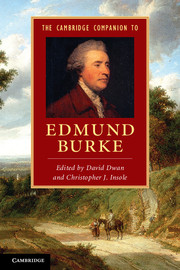Book contents
- Frontmatter
- Contents
- Contributors
- Acknowledgements
- Method of Citation
- Chronology
- Introduction Philosophy in Action
- 1 Burke’s Life
- 2 Burke, Enlightenment and Romanticism
- 3 Burke as Rhetorician and Orator
- 4 Burke’s Aesthetic Psychology
- 5 Burke on Law and Legal Theory
- 6 Burke on Political Economy
- 7 Burke and Religion
- 8 Burke and the Constitution
- 9 Burke and the Natural Law
- 10 Burke and Utility
- 11 Burke and the Ends of Empire
- 12 Burke and the American Crisis
- 13 Burke on India
- 14 Burke and Ireland
- 15 Reflections on the Revolution in France
- 16 Burke’s Counter-Revolutionary Writings
- 17 Burke in the United States
- Further Reading
- Index
- References
11 - Burke and the Ends of Empire
Published online by Cambridge University Press: 05 December 2012
- Frontmatter
- Contents
- Contributors
- Acknowledgements
- Method of Citation
- Chronology
- Introduction Philosophy in Action
- 1 Burke’s Life
- 2 Burke, Enlightenment and Romanticism
- 3 Burke as Rhetorician and Orator
- 4 Burke’s Aesthetic Psychology
- 5 Burke on Law and Legal Theory
- 6 Burke on Political Economy
- 7 Burke and Religion
- 8 Burke and the Constitution
- 9 Burke and the Natural Law
- 10 Burke and Utility
- 11 Burke and the Ends of Empire
- 12 Burke and the American Crisis
- 13 Burke on India
- 14 Burke and Ireland
- 15 Reflections on the Revolution in France
- 16 Burke’s Counter-Revolutionary Writings
- 17 Burke in the United States
- Further Reading
- Index
- References
Summary
The politics of empire and conquest were among Burke’s most intense and abiding preoccupations throughout his life as a writer and legislator. He took up these themes in some of his earliest published writing, his contributions to An Account of the European Settlements in America, written with his friend William Burke and first published in 1757, and he continued to dwell on Indian and especially Irish affairs until his death. Burke’s career spanned a period widely seen at the time, as well as by later historians, as one of imperial crisis. Before entering parliament, Burke returned to his native Dublin in the early 1760s as an aide to William Hamilton, chief secretary in Ireland, during the early phase of the Whiteboy disturbances, when Protestant landlords and the Irish government were savagely suppressing Catholic peasant unrest with reprisals, mass arrests, and judicial murders. By the end of the Seven Years’ War in 1763, Britain had acquired substantial new territories, with diverse and seemingly alien populations, including Quebec, with its large population of French Catholics, and in India, after Robert Clive’s decisive defeat of French ambitions there. British efforts under the Grenville ministry to recoup the costs of the war in America, most infamously through the 1765 Stamp Act, opened the breach with the American colonies that Burke struggled in vain to repair with his policy of conciliation. The crisis in the American colonies dominated Burke’s early years as a member of parliament, especially after he began in 1774 to represent Bristol, the ‘second city in the British dominions’, and a trading city whose prosperity was bound up perhaps more than any other in Britain with colonial commerce. Soon after the break with America, Burke began his fourteen-year campaign to stem the corruption and despotism of the British East India Company, the work for which he claimed near the end of his life to value himself the most (WS, IX: 159).
- Type
- Chapter
- Information
- The Cambridge Companion to Edmund Burke , pp. 145 - 155Publisher: Cambridge University PressPrint publication year: 2012
References
- 2
- Cited by



